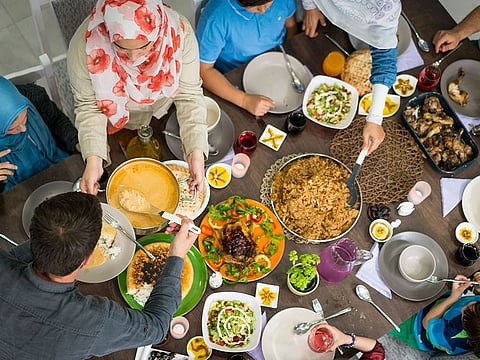Don’t overeat during the Eid holidays, doctors warn
Festive bingeing can lead to a host of health problems

DUBAI: With Eid around the corner, people across the nation are preparing to loosen their belts and embark on a journey of unrestrained gastronomical indulgence. But this delicious debauchery could wreak havoc on the body, doctors have warned.
Gluttons can expect to suffer a host of unpleasant side effects like Gastroesophageal Reflux Disease (GERD), dyspepsia (indigestion) and heartburn if they succumb to one too many servings of popular festive treats like harees, biryani, kebab, lamb ouzi or seviyan (sweet vermicelli)
Digestive problems
“People love to indulge in sweets and heavy meat dishes after a long fasting period. This binge eating can lead to serious problems in the gastrointestinal tract like reflux and acidity and can also lead to weight gain,” cautions Rayan Saleh, clinical dietitian at the department of clinical nutrition, Burjeel Hospital for Advanced Surgery, Dubai. Controlling portion sizes and mindful eating can mitigate these health risks,
“Chew the food slowly to ensure a good digestion, watch what you eat and have a reasonable gap of four to five hours between two major meals to help your body recover,” says Dr Saleh.
Dr Abdul Majeed Mahmoud, gastroenterology specialist at Zulekha Hospital, Dubai, says reverting to a pre-Ramadan eating schedule straightaway can lead to indigestion.
“In Ramadan, the digestive system gets used to having food at certain times (iftar and suhour) of the day. A sudden change to a different eating routine, coupled with unhealthy food, can affect the digestion process and cause bloating and heartburn. It is therefore important to allow the body some time to adjust itself,” he explains.
Dr Mahmoud recommends starting off with a light breakfast on the first day of Eid. “A glass of milk with some dates could be immensely helpful. Avoid overeating and abstain from fatty food and fizzy drinks. Instead, stick to healthy homemade food for the first few days. However, that’s not always possible as one tends to visit friends and relatives for Eid get-togethers. On such occasions, eat small portions and don’t overindulge yourself,” he advises.
Rauan Al Ashqar, clinical dietitian at Medcare also advocates eating small portions to avoid tummy troubles. “The lesser the food intake, the lesser the chances of indigestion,” she reasons. “Beef and lamb meat take long to digest. If you must have them, then go for lean cuts. Alternatively, substitute them with chicken or grilled fish. Stay away from fried food or meals that are high in fat and sugar. Instead go for fresh fruits, veggies and whole grain crackers and drink at least 8-10 glasses of water daily.” she adds.
Al Ashqar also urges people to do some sort of physical activity to aid digestion. “If you can’t find time or a workout go for a walk,” she says.
Dr Amal Premchandra Upadhyay, department of gastroenterology and hepatology, Aster Hospital, Mankhool, says they typically see a spike in overeating cases during this time of the year. “It is advisable to eat slowly and mindfully as you return to your old routine. But for that, your intestines have to first regain a normal pattern of activity — both mechanical and secretory,” he says.
Calorie count
■ Seviyan (Vermicelli): 200-275 calories per 100 grams
■ Chicken harees: 150-175 calories per serving cup
■ Mutton biryani: 400-500 calories per serving
■ Lamb ouzi: 300-375 calories per serving
Common side effects of overeating
Tiredness: Binge eating can spike blood sugar resulting in a feeling of lethargy.
Bloating: Not chewing food properly and having fizzy drinks alongside fatty meals can cause gas and make you feel bloated all day
Nausea: Greasy food take a long time to digest. Overconsumption can leave you nauseated and feeling miserable over the holidays.
Insomnia: Food plays an important role on your glucose and sugar metabolism. A large intake of carbohydrates can cause a surge of glucose and disrupt your sleep cycle.
How to overcome binge eating
Get active: Festive overeating is often closely linked to dopamine release. Do some physical activity to give you the same surge. Go for a brisk walk or try yoga.
Sleep well: Get plenty of sleep. A good nap helps build resilience and you need every bit of that during the festive season.
Avoid caffeine: Keep an eye on your tea and coffee intake. Caffeine increase adrenalin and cortisol, intensifying the cravings for sugar and carbs.
Tackle the table food pusher: “Oh please take one more helping I made these especially for you.” You will hear this from food pushers over the next few days. Turn down the request politely.


